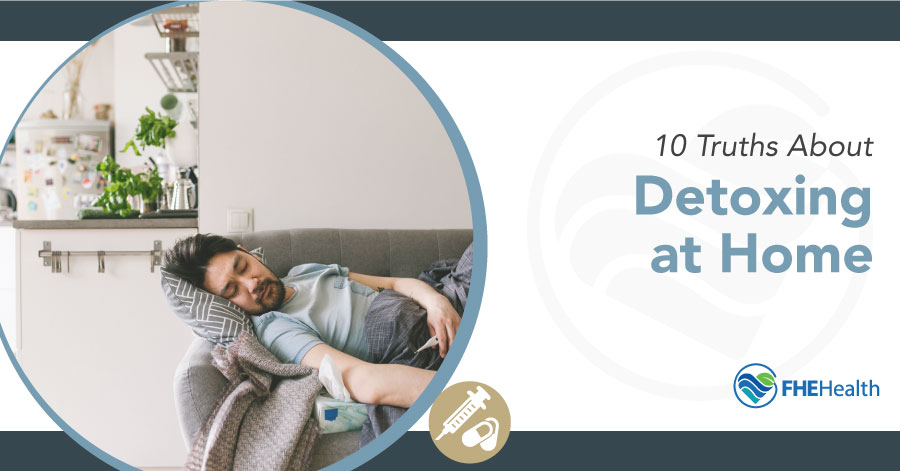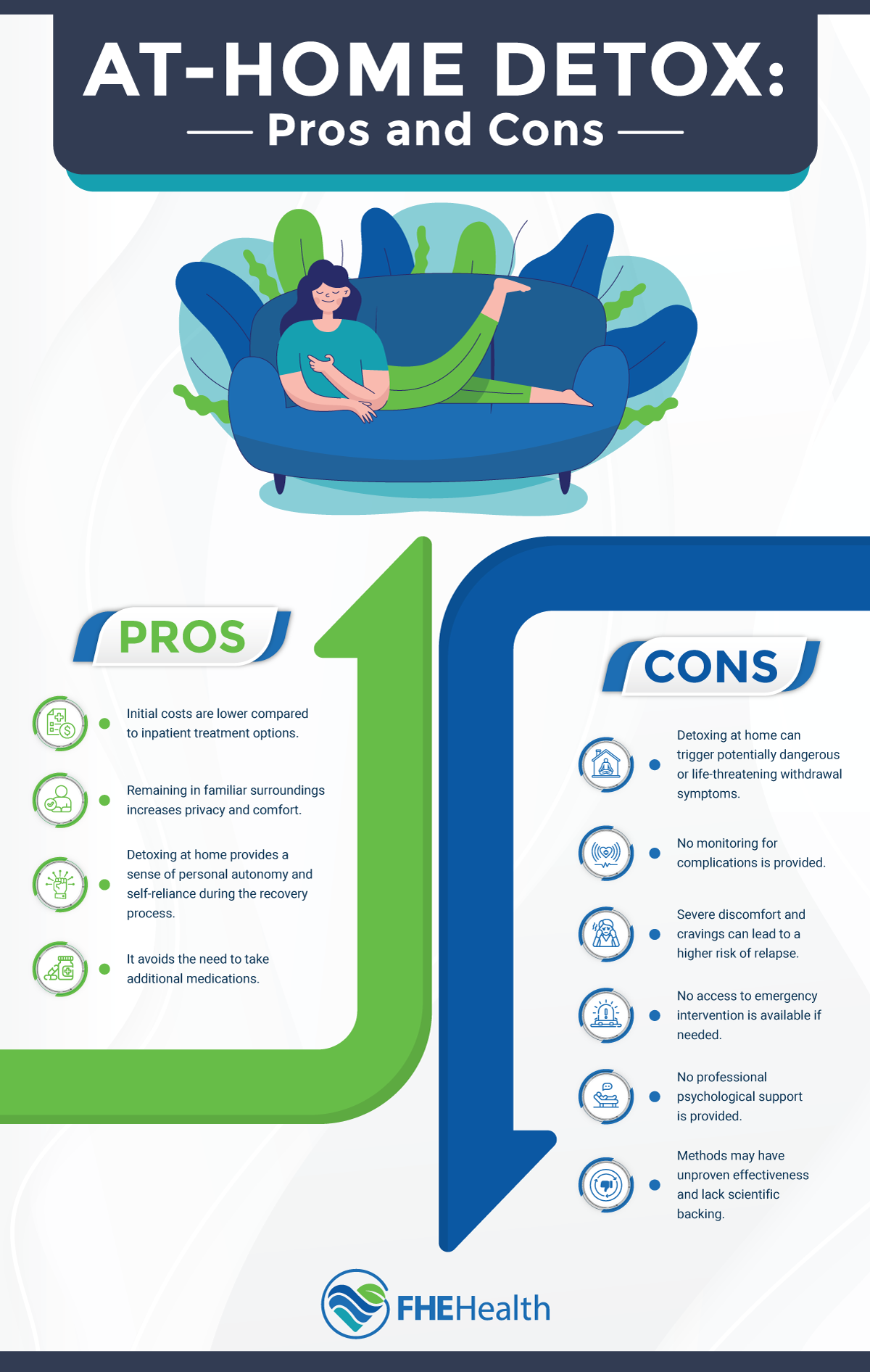
For those living with addiction to drugs or alcohol, eventually, there comes a breaking point. That might mean the loss of a job or a relationship, getting into legal trouble, or showing dangerous physical withdrawal signs. While some may continue to abuse substances, others may see this kind of tragic turn of events as a wake-up call and decide to get clean.
Detox is the first step in any treatment program because breaking through those physical bonds can be both painful and very unpleasant. In some cases, they can even be life-threatening. Some substances, like alcohol, are very dangerous to detox from without professional involvement.
Symptoms can include seizures, delirium tremens, tremors, vomiting, and even organ damage that can result in death. Take 39-year-old “True Blood” actor Nelsan Ellis — he tried detoxing from alcohol at home and died from organ failure due to a blood infection.
These are 10 truths about detoxing from alcohol at home and why it’s important to seek qualified care before quitting substances cold turkey.
1. Detox Is Hard
There’s no way around it — detoxing is hard. When substance use has become a daily habit, the cravings can be intense and the experience can be painful. Some people may be up to the challenge, but many won’t be. This level of intensity means users are likely to give up somewhere within the first few hours.
Unfortunately, those who fail to manage withdrawal symptoms repeatedly may believe the situation is hopeless and give up on seeking help.
2. Detox Takes More Than Willpower
Sheer willpower alone is rarely enough for a successful detox, in large part due to the mental and physical aspects of addiction. For most people, outside support, like a counselor to talk to or medication to alleviate side effects, is a big part of the bridge between success and failure. When the brain is no longer functioning normally due to prolonged substance abuse, willpower will be a weak defense against the body’s urges.
3. Detox Side Effects Can Be Dangerous
Some drugs can be uncomfortable to quit cold turkey, but others are downright dangerous. Physiological changes accompany the mental side of addiction, meaning the body becomes physically addicted to ongoing use. Detoxing from alcohol can cause tremors in the extremities, delirium tremens, and seizures that can lead to injury or death. Benzodiazepines are also very dangerous to detox from without proper medical oversight.
4. Most People Who Detox at Home Relapse
When willpower and fear are the only things keeping a recovering user from taking another drink or another hit, relapse is highly likely. Unlike in a treatment center, where drugs and alcohol aren’t permitted, someone at home could go to the liquor store or hit up a dealer and fall back into old habits within minutes. Without stopgaps in place, relapse is much more likely.
5. Detoxing Without Proper Management Increases Overdose Risk
Some substances are highly addictive and have increased overdose risks, like opiates. While quitting is a noble goal and should be the objective of anyone who displays abusive patterns of use, weaning off these substances can lead to changes in tolerance. Those who attempt to detox for a few days may successfully lower their tolerance level, but they may not realize this if they relapse. Thus, taking a dose that used to be tolerable could prove deadly.
6. When Detoxing Alone, Seeking Help Can Happen Too Late
Detoxing at home may seem convenient and easy, but this is rarely the reality. In a professional recovery facility, help is always seconds away. At home, however, it may be too late when a problem arises. Someone who’s experiencing dangerous withdrawal symptoms may be unable to call for emergency services without assistance. Plus, if an emergency call is placed late, the damage may be done before anyone arrives.
7. Home Detox Means No Medical Support
Detoxing in a treatment facility goes beyond supervision. Doctors and nurses can prescribe medications that alleviate and manage withdrawal symptoms and make sure patients are regularly checked for dangerous side effects. In some cases, medical intervention increases comfort, but at other times, it can save lives. When in doubt, it’s best to let addiction medical professionals guide a detox program based on a person’s substance use history and risk levels.
8. Detoxing at Home Can Hurt Mental Health
Walking away from drugs or alcohol can have a big impact on the body, both physically and mentally. Trying to quit cold turkey can lead to mental health issues, like depression and anxiety. It can also trigger any co-occurring conditions, worsening overall wellness while detoxing. Undergoing detox in a rehab facility can not only minimize negative withdrawal sensations but also provide support for mental health.
9. Detoxing at Home Can Mean No Support System
Many people who detox at home do so because they’re afraid to admit the depth of their issue. Taking this approach means that if things go wrong or a recovering substance user needs a shoulder to cry on, no one will be there. In some cases, a little pep talk might be the only thing necessary to help someone make it from one day to the next, but detoxing at home alone can result in a lonely process.
10. Mortality Rates Are Higher
Death can happen while detoxing in any circumstances, but without a doctor or nurse on hand, it’s far less likely that a bad situation will end with a good resolution. A severe seizure or trouble breathing could be fatal if someone isn’t on hand to help immediately, which is rarely the case when detoxing alone at home.

Asking for help is never easy, but it’s among the best possible steps in recovery. Rather than attempting to detox in a home setting due to fear or shame, reach out to a rehabilitation center with a detox facility and get the help necessary to overcome addiction in a safe, healthy way.
Contact FHE Health today to learn about our addiction treatment programs and step-down approach to rehabilitation. Call us at (833) 596-3502 to see how we can support an effective detox process.






